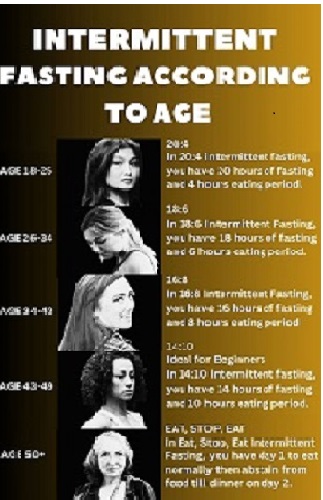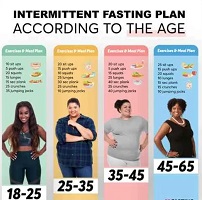Fasting Intermittent According to Age and Gender
Fasting Intermittent According to Age and Gender. Please Watch this video for a better understanding>>>>
The Effects of Intermittent Fasting on Age and Gender
So, here’s how it works:
To begin with, there isn’t enough scientific data to conclusively determine if age affects how effective fasting is.
Since research on IF has been done on people of all ages (yes, even centurions!), thus it’s difficult to determine which timetable works best for whom.
However, research does show that all sorts of fasting schedules are generally safe and effective for adults of all ages, so long as those adults are safe to fast.
Table of Contents
What is the age limit for intermittent fasting (IF)?

There is no strict upper age limit for intermittent Fasting According to Age
Although there isn’t a set upper age restriction for intermittent fasting, it isn’t advised for people under the age of 18, people over the age of 75, women who are pregnant or nursing, people who have eating disorders, and those who have certain medical issues.
Overview of Intermittent Fasting According to Age and Gender
- Alternating between eating and not eating (also known as fasting) involves intermittent fasting.
- Intermittent fasting can improve your health and aid in weight loss.
- There is no scientific evidence to suggest that any IF plan performs better at a certain age.
- The ideal IF plan for you will depend in part on how your lives and bodies develop over time.
The Basics of Intermittent Fasting
It is important to first provide answers to certain fundamental concerns before discussing gender and intermittent fasting.
Intermittent fasting: What is it?
Instead of being a traditional diet, intermittent fasting is a way of eating or a habit of eating.
An intermittent fasting diet places more emphasis on when you eat than on what you consume, as opposed to a typical diet.
With this eating pattern, you alternate between times of severe or total calorie restriction, or fasting, and periods of good eating.
The duration of these calorie-restricted and healthy eating intervals varies depending on personal preference.
Types of Intermittent Fasting to Consider ~ Intermittent Fasting Plan
Daily Method
The most common IF approach is this one. Usually, the daily technique adheres to the 16/8 or 18/6 guideline.
This entails eating typical, healthful foods for six to eight hours each day and fasting for the remaining sixteen to eighteen hours.
The most sustainable approach is proven to be this one. To begin, you can utilize alternative timing configurations.
One of these is a 12/12, which involves eating for 12 hours and then fasting for another 12 hours.
When you are prepared, you can go on to a more rigid timetable.
5:2 Ratio
With this strategy, you eat regular, healthy meals five days a week and restrict your calorie intake to 500–600 calories twice a week.
Do what works for you because it’s uncertain if it’s healthier to consume all of your calories at once or space them out over the day.
Alternate Day Method
This approach allows you to eat properly every other day. You’ll consume only 25% of your daily caloric requirements on the fasting days.
For instance, if you typically consume 1,800 calories per day, you’ll only consume 450 calories during the fasting days.
24-Hour Approach
With this approach, you must go a whole 24 hours without eating. People that employ this technique frequently only fast once or twice a week, from breakfast to breakfast or lunch to lunch.
Be careful if you decide to use this approach. It can cause extreme anger, exhaustion, and headaches, and it’s possible that this approach isn’t the best one for you.
Schedules for other intermittent fasting include:
Water Abstinence
You only take in water during a water fast, which can last anywhere from 24 hours to many days or even weeks. We reject this approach of fasting.
OMAD
The OMAD (One Meal a Day) diet calls for eating just one meal per day, usually within an hour, and going without food for the other 23 hours.
It’s typically followed by extremely skilled fasters, and we wouldn’t ordinarily advise the bulk of you to do so.
Eat Food, Stop, Eat Food
Eat Stop Eat entails abstaining from food for 24 hours once or twice every week, and returning to regular eating habits after the fast.
If you want to try fasts longer than 18 hours, you should always consult your doctor beforehand.
The benefits of IF extend beyond weight loss. Ancient cultures have frequently observed fasting, which is still done in some communities today.
People who should not attempt intermittent fasting
Not everyone should engage in intermittent fasting. Even if a diet is effective, you should always consult your doctor before starting it.
That includes you if you are a person who:
- Is attempting to conceive, pregnant, or nursing
- Is extremely stressed out
- Is under 18.5 on the body mass index (BMI) scale.
- Is extremely active and/or has high energy needs each day
- Is younger than 18 or older than 75
- Suffers from dietary deficits
- Suffers from a medical issue like diabetes or anemia
- Has a history of an eating disorder, and is at risk for developing one, or both
- Uses prescription drugs, particularly those that have an impact on blood pressure or blood sugar
How does intermittent fasting work?
Your body switches from using glucose for energy while you are intermittent fasting to using stored fat because your body needs a source of energy when you are fasting since no glucose is flowing in.
The metabolic change known as ketosis and the naturally lower calorie intake brought on by a smaller window for eating is what causes weight loss and many of the health advantages of intermittent fasting.
Of course, intermittent fasting tends to work better. if you put effort into it,
Intermittent Fasting According to Age
(If you are within the 18–30 age range)
Find a fasting schedule that works with your social schedule.
For many people between the ages of 18 and 30, eating and drinking is an important aspect of social life, whether it be playing beer pong with college friends, and coworkers or spending Sunday evening over wine and cheese with friends
Choosing an intermittent fasting plan, which you can manually change may be perfect if you’re in the “social butterfly” period of life (being social doesn’t have an age limit).
This will allow you to fit your fasting around your social time.
If you’re between the ages of 30 and 45
Find an IF schedule that works for your schedule at home and work.
Perhaps you recently received the promotion you were hoping for in your 20s, and now you’re juggling all the tasks at hand: dinner with the family, that urgent task your boss sent you (thanks, boss), getting your work clothes dry-cleaned, staying up late to enjoy some alone time, etc
If you’re between the ages of 45 and 60
Find a menopause-related weight-gain-supporting intermittent fasting regimen.
You are not alone if you are gaining weight because of the menopause. There are a lot of women just like you. Life can be difficult at times.
The good news is that intermittent fasting might be beneficial. Short-term studies demonstrate that IF programs like 18/6 can help both pre-and post-menopausal women shed weight.
If you are above 60 years (60+)
Pick an IF strategy that makes it simpler for you to receive all the nutrients you require.
We require more nutrients, such as protein, calcium, and vitamin D, as we age (and presumably become wiser).
To give yourself enough time to consume everything you need to take care of your body, err on the side of shorter fasts like 12/12, 14/10, or 16/8 if you’re intermittently fasting in this age range.
Once more, exercise of any kind, but particularly weight training, can be extremely beneficial at this age.
(In actuality, we advise intermittent fasters of all ages to go lift some weights!)
A note for all age groups on medication?
Anyone of any age can take medication. However, as we age, we tend to use more prescription drugs.
Before beginning any intermittent fasting regimen, make sure to see your doctor about any medications you may be taking. If so, make sure to continue taking them in the manner recommended by your doctor (e.g., with food, on an empty stomach, etc.).
IF and Gender: Intermittent Fasting by Gender
Although gender can be a sensitive and divisive subject, there are peculiarities between men and women that should be taken into account when talking about health.
Despite political, economic, and cultural considerations, men and women are genetically (and thus phenotypically) formed differently as a result of biology.
Beyond the X and Y chromosomes, men and women differ from one another.
These disparities can be observed in the fact that men are typically taller than women and that women typically have smaller lungs.
Women and Men and Intermittent Fasting: Women vs. Men
Intermittent fasting is a popular eating plan, much like the ketogenic diet.
More than ten million search results for “intermittent fasting” can be found quickly online.
These links lead to a huge number of publications that extol the wonderful health advantages of this eating pattern. And a lot of these articles are supported by substantial, reliable, and encouraging research.
What could be bad with intermittent fasting, then?
Side effects of intermittent fasting
Unpleasant side effects might result from intermittent fasting. They could consist of nausea, constipation, headaches, fatigue, sleeplessness, irritability, decreased concentration, and appetite loss. Most adverse effects disappear after a month.
Some people may find it simpler to maintain an intermittent fasting schedule than it is to track their calories every day
Others, particularly those with hectic or unpredictable schedules, find it harder to stick to an intermittent fasting plan.
While intermittent fasting is frequently not a great option for women, it might be a fantastic choice for males.
Women should be aware that intermittent fasting has different effects on them than it does on males.
Who Benefits from Intermittent Fasting?
Men can benefit from intermittent fasting in particular, as will be covered in more detail below.
Weight loss and improved body composition are the main advantages of IF. But fasting has a lot of additional positive health effects as well.
Improvements in cardiovascular health, testosterone levels, and insulin resistance are a few of these.
How Does Intermittent Fasting Impact Women vs. Men?
Men and Women May React to Intermittent Fasting Differently
There is some evidence to suggest that not all women will benefit from intermittent fasting as much as males do.
Male and female metabolic responses to exercise, carbohydrates, sleep deprivation, and yes, you got it, fasting, have been influenced by biologically determined gender roles.
Men and women in hunter-gatherer tribes reacted differently to times of abundance and shortage.
Men, who tend to be physically larger, responded to fasting by dramatically increasing their metabolic rate.
According to research, humans still exhibit genetic adaptations to times of scarcity. Men’s metabolisms can accelerate by up to 14% during brief durations of fasting (12 to 24 hours).
Other effects of intermittent fasting on the male body include an increase in testosterone usage of between 10 and 200 percent, an increase in growth hormone of between 100 and 200 percent, and an improvement in blood lipids to support the increased hormonal production and reduced cardiovascular disease risk factors.
But unlike males, women do not benefit from intermittent fasting as much as their male counterparts.
To endure a potential long-term famine, women’s metabolisms slowed down to conserve energy and store fat.
This implies that intermittent fasting might not be ideal for today’s women and their bodies.
Which gender benefits from intermittent fasting the most?
Men generally respond better to intermittent fasting than women do.
They gain the greatest health advantages from this eating pattern. Women, on the other hand, frequently gain from other diets and eating habits.
Women and Intermittent Fasting
Even if further research on this topic would be helpful, women should think about what is already known about intermittent fasting before opting to follow this eating pattern.
Is Intermittent Fasting a Good Diet for Women to Lose Weight?
An intermittent fasting diet is probably not going to help women lose weight, as was already mentioned. Men might gain from foregoing breakfast or once or twice a week, reducing their caloric intake for an entire day.
By taking these steps, you can lose weight and speed up your metabolism. However, it is unlikely that women will benefit from the same diet.
A stable calorie intake each day would be most advantageous for women who desire to optimize their body composition, have consistently high energy, and continuously increase their workout performance.
Instead of intermittent fasting, a steady stream of high-quality calories is more likely to produce the best weight loss outcomes for women.
Health Benefits of Intermittent Fasting for Women
In addition to helping you lose weight, intermittent fasting may also reduce your risk of contracting several chronic illnesses.
- Heart Wellness
- Diabetes
- Loss of weight
- It Could Aid in Eating Less
Women who practice intermittent fasting may have weight loss and a lower risk of diabetes and heart disease.
However, to validate these results, additional human research is required.
Intermittent Fasting for Women After 50
Losing weight might be difficult for women over 50. There are various causes for this.
The primary cause is often a slowed metabolism. Your metabolism increases with the amount of lean muscle you possess.
However, as we age, we tend to become less active than we once were and lose lean muscle mass. The outcome? Fat on the body just won’t seem to go away.
Additionally, menopause symptoms including melancholy, anxiety, and insomnia might be alleviated by intermittent fasting.
For women over 50, intermittent fasting is safe, but food quality and protein consumption should come first.
After the fasting phase, the first meal should contain 40–50 grams of protein.
Men and intermittent fasting
Blood pressure, resting heart rates, and other heart-related parameters were all improved by intermittent fasting. physical activity.
16-hour fasting young males demonstrated fat reduction while retaining muscular mass.
Mice that were fed on alternate days displayed greater running endurance.
Health Benefits of Intermittent Fasting for Men ~ What are the results of intermittent fasting for men?
Male weight loss is one of the main advantages of intermittent fasting. According to one study, participants could reduce their body fat by three to five percent over three to twelve months by fasting.
There are numerous intermittent fasting strategies, but the one you choose must meet your requirements and way of life.
FAQs about Intermittent Fasting According to Age and Gender
Are there gender differences in intermittent fasting?
Men generally respond better to intermittent fasting than women do.
They gain the greatest health advantages from this eating pattern. Women, on the other hand, frequently gain from other diets and eating habits.
What age is best for intermittent fasting?
Williams emphasizes that you should consult with your primary care physician first before attempting intermittent fasting (or any diet).
Those under the age of 18 and children should avoid practicing intermittent fasting. women who are nursing or pregnant.
What type of intermittent fasting is ideal for a female 25-year-old?
The 16:8 or 14:1 diet is the best maintainable plan for women between the ages of 20 and 50.

Is intermittent fasting healthy for girls?
Intermittent fasting (IF) can be a great way for women to lose weight and improve their health, but there are a few extra aspects to take into account, including hormones, personal stress levels, and daily energy expenditure.
Does intermittent fasting affect fertility?
For instance, according to some studies, fasting may interfere with the production of reproductive hormones, which could affect fertility.
However, a new study published in Obesity in October 2022 found that apprehensions over intermittent fasting’s adverse effects on fertility may not be a universal phenomenon.
Does intermittent fasting affect women’s hormones negatively?
Different people react differently to the same eating strategy.
However, there’s a significant likelihood it’s also connected to their sexuality. While many males appear to gain from intermittent fasting, it can be detrimental to a woman’s hormones and metabolism.
Should I intermittently fast on my period?
Yes, it is the answer. As long as you focus on the best meals that can support your menstrual cycle and pay attention to the hormone changes that take place throughout your twenty-eight-day cycle, you can do intermittent fasting.
Does intermittent fasting affect your menstrual cycle?
Fasting can have the unfavorable side effect of causing irregular periods, and some women may experience substantially heavier periods than usual.
Reduce your fasting window and pay attention to the meals you’re eating as this can be a sign that your body is under too much stress.
Intermittent fasting according to age
What is the oldest person who can intermittently fast?
Although there is no set upper age restriction for intermittent fasting, it is not advised for anyone under the age of 18 or above the age of 75, women who are pregnant or nursing, people who have eating disorders, and people who have certain medical issues.
Is there a relationship between intermittent fasting and women’s hormones?
Intermittent fasting may improve insulin resistance and lower body fat in women with specific kinds of PCOS while decreasing levels of androgens, such as testosterone, and lowering levels of female reproductive hormones, according to studies.
Intermittent fasting may be beneficial for regulating hormones in some women. However, fasting may not always be advantageous.
What is the best intermittent fasting window to lose belly fat
One of the most well-liked fasting schedules for weight management is the 16/8 intermittent fasting regimen.
The program limits the consumption of calorie-rich foods and beverages to a predetermined 8-hour period each day. The remaining 16 hours of the day must be without eating.
Intermittent fasting schedule for women ~ popular intermittent fasting methods for women
- The 16/8 technique, calls for a 16-hour fast each day.
- The crescendo approach involves fasting for 12 to 16 hours two to three days per week.
- Eat-stop-eat method: once or twice a week, fast for 24 hours.
- The 5-2/method involves fasting twice a week.
- Fasting every other day is the alternate-day approach.
Intermittent fasting for women over 40
Additional Advantages of IF for Women Over 40
Additionally, I advise adhering to a maximum 16-hour fast and adjusting any blood glucose meds to your eating and fasting schedules.
Intermittent fasting helps improve metabolic syndrome and lower the risk of diabetes and heart disease.
What is the right age for intermittent fasting?
Consult your primary care physician prior to attempting intermittent fasting or any other diet. There are certain folks you should not try intermittent fasting: Children and teenagers under the age of eighteen. ladies who are nursing or expecting.
Does age affect the type of intermittent fasting?
It is essential to take your age and specific requirements into account when choosing an intermittent fasting regimen. In order to prevent any potential dietary deficits or metabolic abnormalities, older persons may benefit from shorter fasting times, whereas younger adults may prefer longer fasting windows.
How long should a woman fast for intermittent fasting?
A dietary regimen known as intermittent fasting entails periodic, brief fasts. The 5:2 diet, modified alternate-day fasting, and daily 14–16-hour fasts are the best options for women.
How many hours should I fast for my age?
According to Hendricks, “many scientists and fasting physicians have determined that daily fasting of up to approximately 18 hours every day is safe and healthy for adults of all ages.”
Does fasting promote healthier aging?
However, there are numerous claims regarding the potential for intermittent fasting to postpone or slow down the aging process. Though it’s a compelling concept, we just don’t know enough at this time to conclude that this anti-aging impact applies to people. A large portion of the research on fasting’s anti-aging benefits has been conducted using animal models.
How many hours of fasting are safe?
The majority of fasting regimens don’t last longer than a day. Anyone who wants to extend their fast should talk to a healthcare provider about the advantages and disadvantages. During a fast, medical practitioners might advise against engaging in physically demanding or vigorous activities.
How long should a 45-year-old fast?
One of the most widely used fasting techniques is this one. consuming all of your calories during an eight-hour window and fasting for sixteen hours every day. It is recommended that women begin with a 14-hour fast and work their way up to 16 hours. This approach is adaptable and suitable for ladies with hectic schedules.
Why is 16 hours the magic number for fasting?
Your body goes through a process called autophagy—a 16-hour fast—during which it eliminates aging or damaged cells. Autophagy is the process by which cells that aid in lowering inflammation and illness are recycled throughout the body.
What is the best intermittent fasting window to lose belly fat
According to a 2023 evaluation of studies, persons who are overweight or obese can effectively reduce their weight by using the 16/8 approach or 16/8 in conjunction with calorie restriction. Eating during the window that opened before noon resulted in more weight loss than eating after noon.
Best intermittent fasting for weight loss
There are three common methods for implementing intermittent fasting:
- Fasting on alternate days. Eat a regular, healthy diet one day, then the following day, either fast entirely or just take one modest meal.
- 5-2 fasting. Eat a normal diet five days a week and fast two days per week.
- Daily time-restricted fasting.
Intermittent fasting schedule for women
16/8 technique: Eat less for the last eight hours of the day and fast for the first sixteen. For instance, eating from noon to eight o’clock or from nine a.m. to five p.m. The 14/10 approach involves just eating for the remaining 10 hours of the day after 14 hours of fasting. For instance, eating from 10 a.m. until 8 p.m.
Intermittent fasting based on BMI
According to a 2022 review that was published in Nature, adults over the age of 70, those with a history of eating disorders, children and adolescents, women who are pregnant or nursing, and those with a BMI under 18.5 are not encouraged to engage in intermittent fasting or calorie restriction in general.
Intermittent fasting chart by weight and height: How do I calculate my intermittent fasting schedule?
Easing into your fasting program is a wise way to fine-tune it. When you find a program that works best for your body, start with a 12-hour fast and work your way up from there. After determining which IF protocol is most effective for you, you can continue at this level, pay attention to your body, and make adjustments as necessary.
Intermittent fasting chart by age and weight: What age is best for intermittent fasting?
Consult your primary care physician prior to attempting intermittent fasting or any other diet. There are certain folks you should not try intermittent fasting: Children and teenagers under the age of eighteen. ladies who are nursing or expecting.
Fasting Intermittent According to Age: 16/8 intermittent fasting
One type of intermittent fasting that is time-restricted is the 16:8 diet. It specifies a 16-hour fast before an 8-hour break for eating. Potential advantages could include fat and weight loss as well as a lower chance of contracting certain diseases.
Fasting Intermittent According to Age: The best intermittent fasting schedule
Intermittent fasting with time restrictions (16:8 or 14:10). Especially for novices, one of the most popular IF techniques is time-restricted fasting. Using this strategy, you can fast for 16 or 14 hours a day and have an 8- or 10-hour eating window, respectively, according to the 16:8 or 14:10 timetable.



